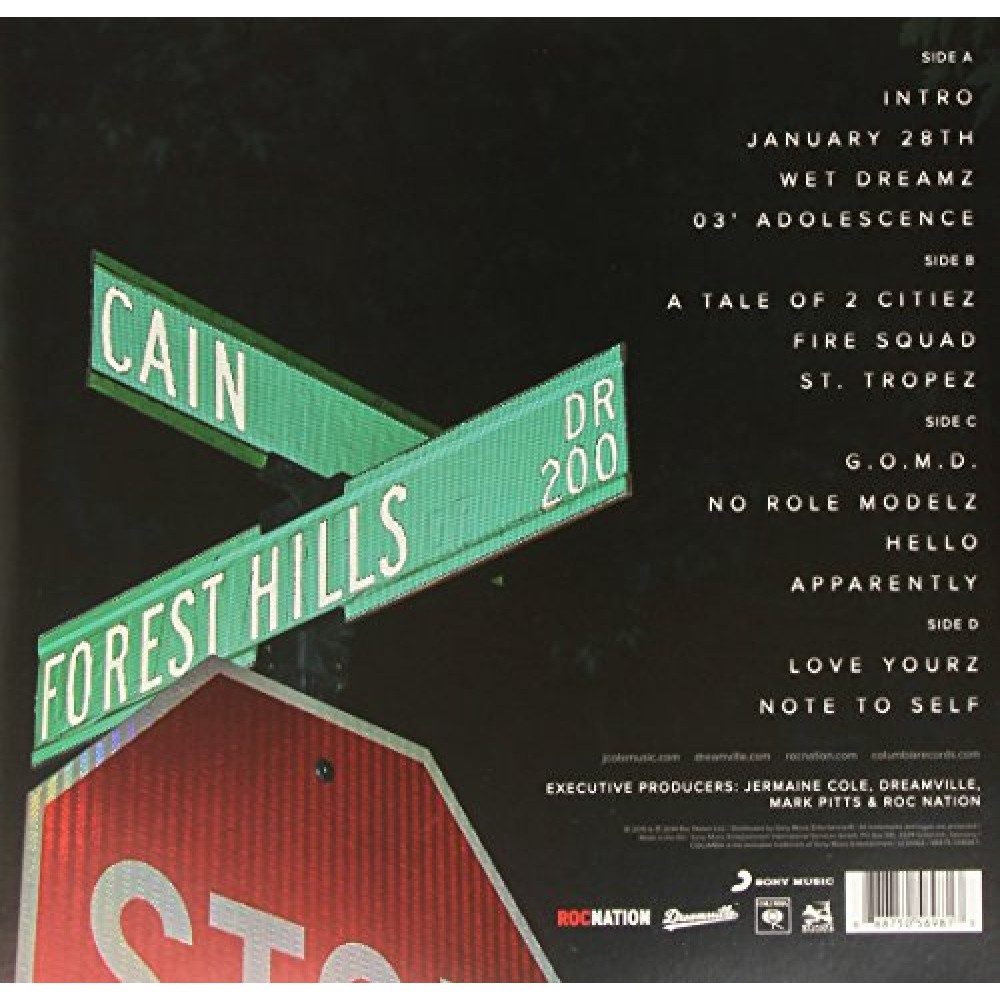Exploring The Legacy Of 2014 Forest Hills Drive: A Journey Through Music And Culture
Yo, let me tell you somethin'. There’s this album that just kinda changed the game for a lot of people. 2014 Forest Hills Drive, yeah, you heard me right. It's like a masterpiece carved out of raw emotion, personal experiences, and cultural depth. This album is more than just music; it's a story, a journey, and a reflection of what it means to grow up, find yourself, and embrace your roots. If you're into hip-hop, culture, or just good vibes, this one's for you.
So here's the deal: J. Cole dropped this album in 2014, and it was like a thunderclap in the music world. The title itself, 2014 Forest Hills Drive, is packed with meaning. It's not just a random address; it's a nod to where he grew up, the place that shaped him into the artist he is today. This album is like a time capsule, capturing moments, memories, and the essence of Cole's life. Stick with me, and we'll dive deep into what makes this project so special.
But before we get too far ahead of ourselves, let’s set the scene. The music industry was in a weird place back in 2014. Everyone was chasing trends, trying to fit into the mold of what was "popular." But Cole? Nah, he did his own thing. He stayed true to himself, and that authenticity resonated with fans all over the globe. So, buckle up, because we’re about to embark on a trip through the legacy of 2014 Forest Hills Drive.
Read also:Exploring The Impact Of The Kelce Brothers Podcast A Deep Dive Into Their Journey
Biography of J. Cole: The Man Behind the Music
Early Life and Influences
Alright, let's rewind a bit and talk about the dude behind the mic. J. Cole, born Jermaine Lamarr Cole, hails from Fayetteville, North Carolina. He grew up in a military family, which gave him a unique perspective on life. Cole spent a lot of time at his grandma’s house on Forest Hills Drive, and that place became the backdrop for some of his most profound work.
Now, growing up, Cole was into basketball, thinking he might make it big in sports. But music was always there, lurking in the background. He started rapping in high school, and by the time he hit college, he was fully immersed in the craft. His early influences ranged from Nas to Jay-Z, and you can hear those echoes in his music today.
| Name | Jermaine Lamarr Cole |
|---|---|
| Born | January 28, 1985 |
| Place of Birth | Fayetteville, North Carolina |
| Genre | Hip-Hop/Rap |
| Label | Dreamville, Roc Nation |
| Breakthrough | 2009, "The Come Up" |
Understanding the Significance of 2014 Forest Hills Drive
Why the Title Matters
So, why the heck is the album called 2014 Forest Hills Drive? Well, it's all about context, man. Forest Hills Drive is where Cole spent a chunk of his childhood. It's the place where he learned about life, love, and struggle. The "2014" part? That’s a nod to the year he made the album, but also a reminder that he's still the same guy from that neighborhood, even as his career skyrocketed.
This title is like a declaration of identity. Cole wasn't trying to be something he wasn't. He wanted to remind everyone, including himself, that no matter how far you go, you can't forget where you came from. And that’s a powerful message, especially in a world where authenticity is often lost in the shuffle.
The Tracks That Define the Album
Key Songs and Their Meaning
Alright, let’s break down some of the standout tracks from 2014 Forest Hills Drive. Each song on this album tells a story, and together, they create a narrative that’s both personal and universal.
- "Intro": Sets the tone for the album, with Cole reflecting on his journey and the people who shaped him.
- "G.O.M.D. (Grown Over Money and Drugs)": A deep dive into the struggles of staying true to yourself in an industry obsessed with material wealth.
- "Fire Squad": One of the most popular tracks, it’s a banger that showcases Cole’s lyrical prowess and his ability to blend introspection with energy.
- "No Role Modelz": A fan favorite, this song addresses the lack of positive role models and the importance of self-accountability.
- "1985 (Intro to The Fall Off)": A nostalgic track that pays homage to Cole’s childhood and the music that inspired him.
Each of these songs adds a layer to the album’s overall theme, creating a cohesive and compelling narrative.
Read also:Perfecting Steak Medium Internal Temp A Comprehensive Guide
The Cultural Impact of 2014 Forest Hills Drive
How the Album Resonated with Fans
When 2014 Forest Hills Drive dropped, it was like a breath of fresh air in the hip-hop scene. Fans connected with the album on a deep level because it spoke to their experiences, struggles, and aspirations. Cole wasn’t just rapping about partying or money; he was rapping about real life, and that resonated with people.
The album also sparked conversations about race, class, and identity. Cole’s lyrics encouraged listeners to think critically about the world around them and their place in it. It’s no wonder that 2014 Forest Hills Drive became a cultural touchstone for so many.
Production and Collaborations
Behind the Scenes
One of the coolest things about 2014 Forest Hills Drive is the production. Cole worked with some seriously talented producers, including himself. Yeah, he produced a bunch of the tracks himself, showing off his versatility as an artist.
The collaborations on the album were also on point. Features from artists like Jason Vinson and James Fauntleroy added depth and texture to the music. But the real star of the show was Cole himself, bringing his A-game to every track.
Themes Explored in the Album
Identity, Growth, and Reflection
At its core, 2014 Forest Hills Drive is an exploration of identity, growth, and reflection. Cole dives into topics like self-discovery, the pressures of fame, and the importance of staying grounded. He also tackles social issues, using his platform to bring attention to important topics.
These themes are woven throughout the album, creating a tapestry of sound and meaning that’s both complex and accessible. It’s a testament to Cole’s artistry and his ability to connect with his audience on a deeper level.
Critical Acclaim and Commercial Success
What the Critics Said
Critics absolutely loved 2014 Forest Hills Drive. The album received widespread praise for its lyrical depth, production quality, and emotional resonance. It was hailed as one of the best albums of 2014, and for good reason.
Commercially, the album was a massive success. It debuted at number one on the Billboard 200 chart and has since gone platinum multiple times. The success of 2014 Forest Hills Drive solidified Cole’s place as one of the most important voices in modern hip-hop.
Legacy and Influence
How the Album Shaped Hip-Hop
The legacy of 2014 Forest Hills Drive is undeniable. It influenced a generation of artists and fans, setting a new standard for authenticity and artistry in hip-hop. Cole’s willingness to be vulnerable and honest in his music inspired countless others to do the same.
Today, the album is regarded as a classic, and its impact continues to be felt in the music industry and beyond. It’s a reminder that music has the power to change lives and shape culture.
Final Thoughts and Reflection
As we wrap up this journey through 2014 Forest Hills Drive, it’s clear that this album is more than just a collection of songs. It’s a testament to the power of storytelling, the importance of authenticity, and the impact that music can have on culture.
If you haven’t already, give this album a listen. Trust me, it’s worth it. And when you’re done, drop a comment and let me know what you think. Share this article with your friends, and check out some of our other content while you’re at it. Let’s keep the conversation going!
Daftar Isi:
- Biography of J. Cole: The Man Behind the Music
- Understanding the Significance of 2014 Forest Hills Drive
- The Tracks That Define the Album
- The Cultural Impact of 2014 Forest Hills Drive
- Production and Collaborations
- Themes Explored in the Album
- Critical Acclaim and Commercial Success
- Legacy and Influence
- Final Thoughts and Reflection


